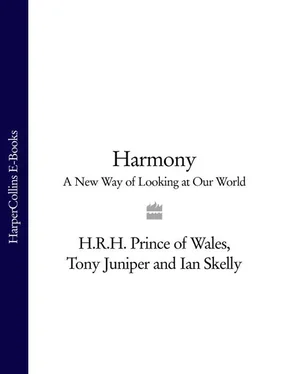Before we begin our journey there are a number of key words and terms that I will use throughout that I feel I should explain. One of these terms is ‘mechanistic thinking’. This stems from what happened in Western thought from the seventeenth century onwards, after the great pioneers of empirical discovery like Descartes and Francis Bacon laid down the principles of the Scientific Revolution. Nature began to be understood in the more clinical terms of its mechanics, as we shall see. This is because, in the main, our science has been based on a ‘reductionist’ approach. Organisms are broken down and their separate parts are studied in mechanical terms. Hence in schools today children are generally taught to see the human heart as nothing more than a pump, the lungs as a set of bellows, and the brain as some sort of very clever computer with the human mind conveniently explained away as the product of an electromagnetic effect of brain function. Despite the incredible leaps that Quantum Mechanics and Particle Physics and the lessons on the interconnectivity of matter they so readily offer us, it still appears odd that many people seem not to have a knowledge of these things. Is this, perhaps, why things start to get a bit fuzzy in the schoolroom when it comes to defining consciousness in mechanistic terms or, for that matter, the imagination. Quite where the resonance we feel for the beauty of things or, ultimately, love is anybody’s guess. The consequence of this outlook is that we have amassed an extensive database of how the world works that has enabled us to increase the speed and adaptability of many elements of the natural world, but in doing so we have lost a valuable and ancient perspective.

RIGHT: Animals kept in crates, reared all their lives in sheds and fed on a diet of corn and growth hormones disconnects even the creatures we rely upon for our food from the natural world. Factory farming is said to be the only way to feed the world, but this ignores the massive hidden costs and the need to give back to Nature as much as we take. There are better ways to produce food than this.
The eighteenth–century agenda of the Enlightenment, based predominantly on the pursuit of progress through science and technology, is so much a part of the furniture today that we do not even question it as an ideology. And yet it is as if we peer at the world through a letterbox, believing that what our science reveals to us is the whole picture even though science does not itself deal with the meaning of things, nor does it encourage a very joined-up way of working. As a result, time and again one problem is solved, but in its wake many others are created, often far worse than the one we set out to resolve.
To see this in action we only have to consider the way water companies in the UK have to spend around £100 million a year removing pesticides and other chemicals from the water supply. These chemicals are the fallout of a supposedly efficient form of industrialized agriculture – an agriculture that works according to mechanistic thinking. The same mechanistic response is applied in the US, where every year many more millions of dollars are spent blasting fresh meat with ammonia in enormous, gasguzzling chemical plants to cleanse it of the fatal E. coli bug that has blighted the food industry for decades. This bug is only there because of the intensive way in which cattle are reared on a diet of corn on vast ‘feed lots’ which are, to all intents and purposes, like concentration camps for cattle. Much of the E. coli bug could easily be removed from the gut of cattle simply by giving them what they are designed by Nature to eat, which is grass, but that does not automatically follow when mechanistic thinking is at work. The knee-jerk reaction is to use more and very costly technology to solve any problems that arise from the solution to an original problem, and so we spawn yet more problems, each one solved in the same isolated way. Nature has the simpler remedy, but she is excluded from the process. She is no longer involved in the cure.
This fragmented view of the world extends to the way people are expected to behave. I come across many instances when the absence of this understanding of how we really fit within the great scheme of things forces people to censor what their intuition might be telling them, to the point where I sometimes wonder if there are a considerable number of people living an almost schizophrenic-like existence. The pressure can be enormous on individuals to draw a very clear line between their private feelings and their public, professional occupation. I have lost count of the number of people I have spoken with who tell me quietly of how, even though privately they may feel deeply anxious inside themselves about the consequences of this whole mechanistic approach, when at work they are expected to lock those feelings away and follow the corporate diktat, which so often reflects the mechanistic mindset that can be so destructive of Nature and her systems.
If we continue to engineer the extinction
of the last remaining indigenous, traditional
societies, we eliminate one of the last remaining
sources of that wisdom.
This bizarre denial has far-reaching and serious consequences for the lives of millions of people, and all the more so if it manifests itself in those who effectively run the world. I intend to give graphic details of the ultimate price some of the poorest farmers in India have had to pay because of it. But it is not just the lives of those in developing countries. Many small-scale farmers in the US also find themselves up against the same might of a globalized system that allows only a few giant corporations to control more or less the whole food production and distribution system across an increasing proportion of the world.
I find it revealing that a substantial number of the people who work for such organizations can often feel instinctively anxious about what this current world view expects of them, but they dare not express their disquiet for fear of being considered old-fashioned, not ‘on message’ or anti-science. They can see quite clearly the long-term implications of what they are being asked to do in their professional lives, but even so, I suspect that if I asked them whether they have any sense of the inner value of things when it comes to the decisions they take, or whether they look beyond the mechanics of Nature to obtain a true sense of what life consists of, the chances are they would feel obliged to accuse me of relying on ‘superstition’. They would most certainly fight shy of agreeing that there may be such a thing as an invisible ‘pattern’ in which all manifestations of life take place. But if they were to realize how many people in the same situation felt the same way about the consequences of what they are doing, I wonder whether they would think again, or even have the confidence to stick their heads above the parapet. I would certainly welcome the company!
Even if words like ‘spiritual’ and ‘sacred’ are a step too far for some, anyone who stands back and considers what has been done to Nature by what is now the dominant approach could be forgiven for thinking that simple common sense has been abandoned. How else could we have embarked upon such a singular and self-destructive enterprise to prove beyond doubt that we can, indeed, do without the rest of the natural world? For that is what we are doing. We are testing the world to destruction and the tragedy – no, the stupidity – is that we will only discover the real truth when we have finally succeeded in completely denuding the world of its complex life-giving forces and eradicating traditional human wisdom.
Читать дальше













